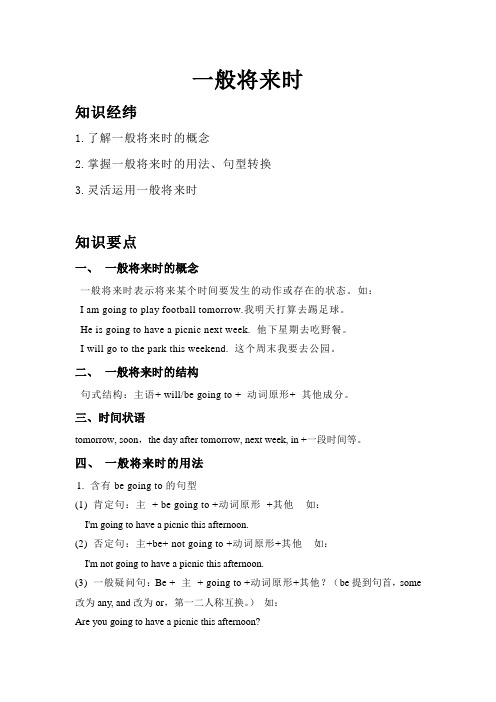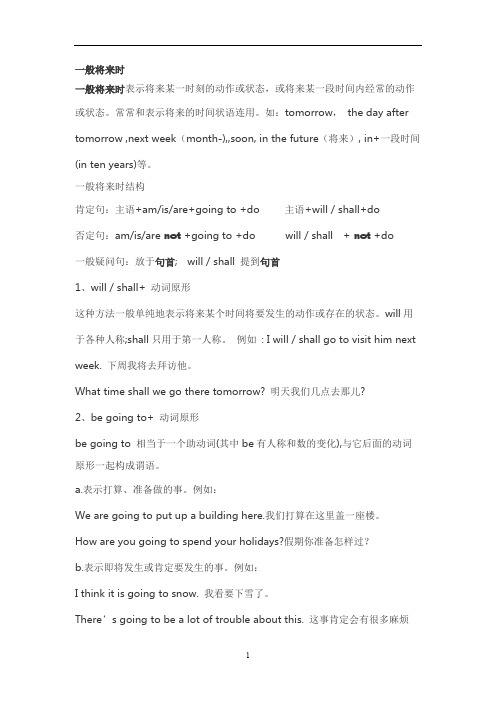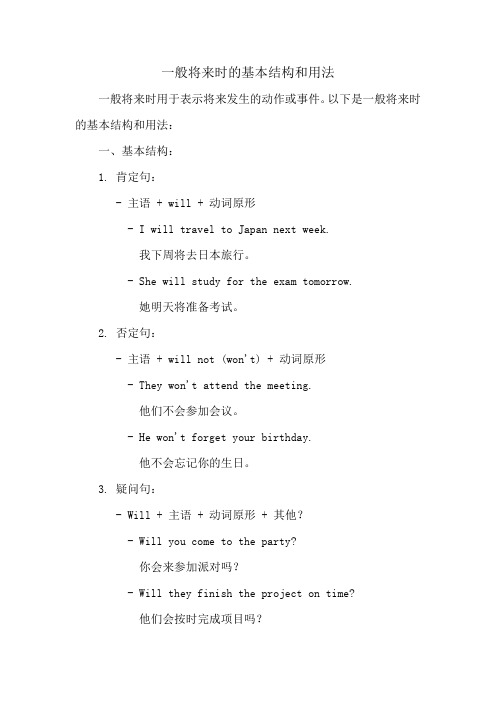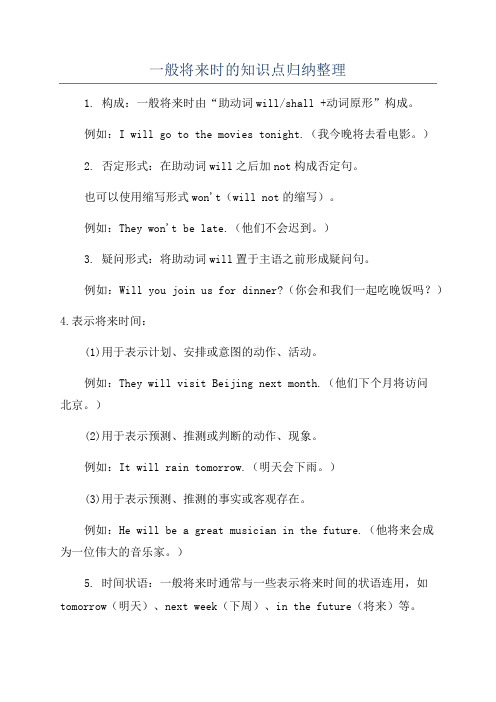一般将来时的时间状语
一般将来时

一般将来时知识经纬1.了解一般将来时的概念2.掌握一般将来时的用法、句型转换3.灵活运用一般将来时知识要点一、一般将来时的概念一般将来时表示将来某个时间要发生的动作或存在的状态。
如:I am going to play football tomorrow.我明天打算去踢足球。
He is going to have a picnic next week. 他下星期去吃野餐。
I will go to the park this weekend. 这个周末我要去公园。
二、一般将来时的结构句式结构:主语+ will/be going to + 动词原形+ 其他成分。
三、时间状语tomorrow, soon,the day after tomorrow, next week, in +一段时间等。
四、一般将来时的用法1. 含有be going to的句型(1) 肯定句:主+ be going to +动词原形+其他如:I'm going to have a picnic this afternoon.(2) 否定句:主+be+ not going to +动词原形+其他如:I'm not going to have a picnic this afternoon.(3) 一般疑问句:Be + 主+ going to +动词原形+其他?(be提到句首,some 改为any, and改为or,第一二人称互换。
)如:Are you going to have a picnic this afternoon?肯定回答:Yes, I am.否定回答:No, I’m not.2. 含有will的句型(will可用于所有人称,shall只用于第一人称I和we)( 1 ) 肯定句:主+ will +动词原形+其他如:I will play football tomorrow.(2) 否定句:主+ won’t +动词原形+其他(will后加not成won't)如:I won’t play football tomorrow.(3) 一般疑问句:Will + 主+ +动词原形+其他?(will提到句首,some改为any, and改为or,第一二人称互换) 如:Will you play football tomorrow?肯定回答:Yes, I will.否定回答:No, I won’t.五、一般将来时的特殊疑问句一般情况下,一般将来时的对划线部分有三种情况。
一般将来时用法及例句

一般将来时一般将来时表示将来某一时刻的动作或状态,或将来某一段时间内经常的动作或状态。
常常和表示将来的时间状语连用。
如:tomorrow,the day after tomorrow ,next week(month-),,soon, in the future(将来), in+一段时间(in ten years)等。
一般将来时结构肯定句:主语+am/is/are+going to +do 主语+will / shall+do否定句:am/is/are not +going to +do will / shall + not +do一般疑问句:放于句首; will / shall 提到句首1、will / shall+ 动词原形这种方法一般单纯地表示将来某个时间将要发生的动作或存在的状态。
will用于各种人称;shall只用于第一人称。
例如: I will / shall go to visit him next week. 下周我将去拜访他。
What time shall we go there tomorrow? 明天我们几点去那儿?2、be going to+ 动词原形be going to 相当于一个助动词(其中be有人称和数的变化),与它后面的动词原形一起构成谓语。
a.表示打算、准备做的事。
例如:We are going to put up a building here.我们打算在这里盖一座楼。
How are you going to spend your holidays?假期你准备怎样过?b.表示即将发生或肯定要发生的事。
例如:I think it is going to snow. 我看要下雪了。
There’s going to be a lot of trouble about this. 这事肯定会有很多麻烦一、选择填空:( ) 1. There __________ a meeting tomorrow afternoon.A. will be going toB. will going to beC. is going to beD. will go to be( ) 2. Charlie ________ here next month.A. isn’t workingB. doesn’t workingC. isn’t going to workingD. won’t work( ) 3. He ________ very busy this week, he ________ free next week.A. will be; isB. is; isC. will be; will beD. is; will be( ) 4. There ________ a dolphin show in the zoo tomorrow evening.A. wasB. is going to haveC. will haveD. is going to be( ) 5. –________ you ________ free tomorrow?– No. I ________ free the day after tomorrow.A. Are; going to; willB. Are; going to be; willC. Are; going to; will beD. Are; going to be; will be ( ) 6. Mother ________ me a nice present on my next birthday.A. will givesB. will giveC. givesD. give( ) 7. – Shall I buy a cup of tea for you?–________. (不,不要。
(完整版)英语中八种常见时态常用时间状语归纳

英语中八种常见时态常用时间状语归纳一、一般现在时1。
概念:表示现阶段经常发生的动作或现在的某种状况,也表示客观事实、客观规律或客观真理。
谓语动词要用原形,主语是第三人称时,谓语动词要用第三人称单数形式。
2. 常见时间状语标志:always, often, sometimes, usually, every day, on Sundays, once a day / week / month等。
例如:I do some exercise every day. 我每天做一些锻炼。
She knows French and German besides English。
除英语外,她还懂法语和德语。
The sun rises in the east. 太阳从东边升起.二、一般将来时1。
概念:表示将来发生的动作或存在的状态,以及打算、计划或准备做某事。
2。
常见时间状语标志:tomorrow, the day after tomorrow,next day / week / month / year…, this week / month / year, soon, in + 时间状语(如in one hour / in a few minutes等),in the future,in future等。
例如:I’ll take you there tomorrow. 我明天带你去那儿。
Next month we will have our school open day。
下个月我们将迎来学校开放日。
The Talent Show is coming in two weeks’ time. 新秀选拔演出还有两周时间就要到了。
三、一般过去时1。
概念:表示在过去的某个时间发生的动作或存在的状态,也表示过去习惯性、经常性的动作。
谓语动词要用过去时。
2。
常见时间状语标志:yesterday, the day before yesterday, last night / week / month,时间词+ ago (如three days ago), in / on + 过去的时间词(如in 2010), just now, at that time, in those days, one day, long long time ago, once upon a time等.例如:Two years ago she bought an expensive mountain bike. 两年前,她买了一辆昂贵的山地自行车。
一般将来时的基本结构和用法

一般将来时的基本结构和用法
一般将来时用于表示将来发生的动作或事件。
以下是一般将来时的基本结构和用法:
一、基本结构:
1. 肯定句:
- 主语 + will + 动词原形
- I will travel to Japan next week.
我下周将去日本旅行。
- She will study for the exam tomorrow.
她明天将准备考试。
2. 否定句:
- 主语 + will not (won't) + 动词原形
- They won't attend the meeting.
他们不会参加会议。
- He won't forget your birthday.
他不会忘记你的生日。
3. 疑问句:
- Will + 主语 + 动词原形 + 其他?
- Will you come to the party?
你会来参加派对吗?
- Will they finish the project on time?
他们会按时完成项目吗?
二、用法:
- 表示将来发生的动作或事件。
- 表示预测、承诺、意图、计划等将来的行为或状态。
- 通常与表示将来时间的时间状语连用,如 tomorrow, next week, in the future 等。
值得注意的是,一般将来时通常用于与将来相关的动作和事件,而对于已经计划或安排好的未来事件,可以使用 "be going to" 结构。
一般将来时知识点

一般将来时知识点一般将来时是英语中常用的一种时态,用来表示将来发生的动作或状态。
在句子中,一般将来时通常由助动词"will"或"shall"加动词原形构成。
除了表示将来的动作或状态外,一般将来时还可以表示决心、意图、预测、承诺以及请求等不同的语义。
下面是一些一般将来时的知识点:1.一般将来时的基本结构:主语 + will/shall + 动词原形+ …例如:- I will visit my grandparents tomorrow.(我明天会去看望我的祖父母。
)- He shall help you with the project.(他会帮助你完成这个项目。
)2.一般将来时的否定形式:主语 + will not/shall not + 动词原形+ …例如:- They will not arrive on time.(他们不会准时到达。
)- She shall not attend the meeting.(她不会参加会议。
)3.一般将来时的疑问形式:将助动词"will"或"shall"提前到句子的主语之前,并且将句末的问号加在句子结束处。
例如:- Will you come to the party?(你会来参加聚会吗?)- Shall we go for a walk?(我们去散步好吗?)4.一般将来时与时间状语的搭配:一般将来时经常和表示将来时间的状语词或短语一起使用,如:tomorrow(明天)、next week(下周)、in the future(在未来)等。
例如:- We will have a meeting tomorrow.(我们明天有个会议。
)- She shall complete the report next week.(她下周会完成这份报告。
)5.一般将来时表示打算、意图:一般将来时也经常用来表示打算、意图或计划要做某事。
一般将来时的构成和用法

一般将来时的构成和用法一般将来时是英语中用来表达将来发生的动作或事件的时态。
它的构成相对简单,一般由助动词“will”+动词原形构成。
在某些情况下,也可以使用“be going to”来表示将来时。
一、构成1. “will + 动词原形”二十年后,我将会是一名成功的科学家。
Twenty years from now, I will be a successful scientist.2. “be going to + 动词原形”明天,我打算去购物。
I am going to go shopping tomorrow.二、用法1. 表示计划或意图我明天打算学习数学。
I will study math tomorrow.2. 表示预测或猜测我认为明天会下雨。
I think it will rain tomorrow.3. 表示承诺或意愿我会帮你完成这个项目。
I will help you with this project.4. 表示打算或决定我打算明天早上锻炼身体。
I am going to exercise in the morning.5. 表示预定或安排明天我将和朋友们去看电影。
I will go to the movies with friends tomorrow.三、注意事项1. 一般将来时通常与表示将来的时间状语连用,比如tomorrow(明天)、next week(下周)、in the future(将来)等。
2. 当表示按计划或安排好的未来事件时,一般使用“be going to”而不是“will”,因为“be going to”强调的是事先的决定或计划。
3. 一般将来时所表示的动作或事件并不一定是肯定会发生的,而是说话人的预测、打算、意愿等。
四、例句1. 我将和朋友一起去看电影。
I will go to the movies with my friends.2. 我会告诉你事情发生的细节。
英语时态一般将来时

(二)“be going to+动原” 与“现在进行时”
be going to主要表示主观想法或意图, 而现在进行进表示将来强调作出的安排。
比较:
I’m going to wash the car if I have time.
I’m picking you up at 6; don’t forget.
(三)一般将来时的句式转换
1.否定 2.疑问 a.一般疑问
b.特殊疑问
(一) “will / shall+动词原形”
“be going to +动词原形” @1 一般可互换; @2
经过事先考虑好的,则通常要用be going to 说话的当时才临时想到的,则通常用will。
@3
若是有迹象表明要发生某事,通常 只用be going to。
@5一般现在表将来
1.按规定要发生的事或表示事实;
The train leaves at 7:25 this evening. Tomorrow is Wednesday.表将来;
1.There ____ a concert on People Square next Monday evening.
@1(be to) @2(be about to) @3(be due to)
三者均表示计划或打算即将要发生的 动作;
但@2一般的用法是表客观即将发生 之事,否定句中才表主语的计划性。
@4现在进行时表将来
现在进行时表将来的动作,谓语 通常为瞬间动词。如: come, go, arrive, leave start, return, stay, meet, get 等。
(二)一般将来时的构成
a.一般将来时的基本构成
@1 will/shall + 动词原形
一般将来时的知识点归纳整理

一般将来时的知识点归纳整理1. 构成:一般将来时由“助动词will/shall +动词原形”构成。
例如:I will go to the movies tonight.(我今晚将去看电影。
)2. 否定形式:在助动词will之后加not构成否定句。
也可以使用缩写形式won't(will not的缩写)。
例如:They won't be late.(他们不会迟到。
)3. 疑问形式:将助动词will置于主语之前形成疑问句。
例如:Will you join us for dinner?(你会和我们一起吃晚饭吗?)4.表示将来时间:(1)用于表示计划、安排或意图的动作、活动。
例如:They will visit Beijing next month.(他们下个月将访问北京。
)(2)用于表示预测、推测或判断的动作、现象。
例如:It will rain tomorrow.(明天会下雨。
)(3)用于表示预测、推测的事实或客观存在。
例如:He will be a great musician in the future.(他将来会成为一位伟大的音乐家。
)5. 时间状语:一般将来时通常与一些表示将来时间的状语连用,如tomorrow(明天)、next week(下周)、in the future(将来)等。
例如:She will start her new job next Monday.(她下周一将开始新的工作。
)6.与其他时态的关系:(1)过去将来时:在过去的其中一时间,表示在那个时间将来发生的动作。
例如:When I saw Tom, he said he would help me.(当我看到汤姆的时候,他说他会帮助我。
)(2)现在进行时表示将来:用现在进行时表示按计划或安排即将发生的动作。
例如:We are leaving for Paris tomorrow.(我们明天动身去巴黎。
)7.注意事项:(1)一般将来时不能用于表示客观真理、永久性事实或习惯性动作。
- 1、下载文档前请自行甄别文档内容的完整性,平台不提供额外的编辑、内容补充、找答案等附加服务。
- 2、"仅部分预览"的文档,不可在线预览部分如存在完整性等问题,可反馈申请退款(可完整预览的文档不适用该条件!)。
- 3、如文档侵犯您的权益,请联系客服反馈,我们会尽快为您处理(人工客服工作时间:9:00-18:30)。
______________________________________________________________________________________________________________
精品资料
一般将来时时间状语归纳总结
1. 含next的短语 next day/week/ month/year/term
2. 含tomorrow的短语tomorrow/the day after tomorrow ,tomorrow morning/afternoon
/evening
3. 含in的短语,后跟一段时间,表示“以现在为起点,多长时间后”in two days/years
4. 含this 的短语,表示与现在相比较,将来的某个时候,this
morning/afternoon/evening/Wednesday/ Saturday/ weekend
5. when 引导的时间状语从句 when he grows up
6. 单个的短语soon(不久) tonight(今晚) some day(将来的某一天) one day(将
来的某一天) in the future(在未来) before long (不久后)from now on(从现在
开始)
______________________________________________________________________________________________________________
精品资料
Welcome To
Download !!!
欢迎您的下载,资料仅供参考!
7.
